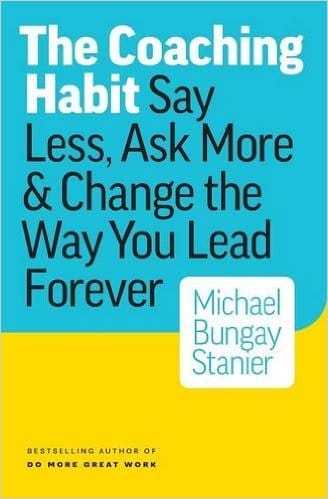Imagine that a close friend, relative or colleague comes to you with an issue. She gives you some of the background. You listen quietly for several minutes. Then, you start seeing the solution materialize in your brain. She takes a short pause to catch her breath before her next sentence and you seize the opportunity to jump in because ‘helping others’ is a big part of who you are and how you conduct your life. Your sentence starts with, “You know, you should…” And, it’s all downhill from there…
Michael Bungay Stanier may have done the impossible by writing an incredibly powerful AND simple-to-follow book that (with practice) can help anyone become a better leader and coach. The Coaching Habit is consistent with the guidelines put forth by the International Coaching Federation whose core competencies stress the idea of asking more questions to help clients come to their own conclusions instead of telling them what they should or need to do.
And, the genius of the book is that Bungay Stanier has reduced it down to seven simple questions that anyone could use to be more effective when helping others. Of course, coaches and leaders ask more than these seven – these are just a great place to start!
- “What’s on your mind?” This question’s power comes from its ability to put the focus on the other person. There is no need to frame it, either. Let the other person take you on their path. And, don’t fill the space with more talking or run-on questions. With this question, simply experience the magic of a good, open-ended question. Resist the urge to talk and watch how (sometimes) the other person finds the answer by just having some else listen! In the
 end, this is about kickstarting the conversation.
end, this is about kickstarting the conversation. - “And, what else?” Once your friend or colleague has answered the first question, there are two “villains” to look for in the conversation. First, resist the urge to interrupt and give advice. You don’t have all the information you need, anyway. Second, their first try at answering may not be all there is to it. By asking, “And, what else?” several times, you challenge the person to expand their knowledge about their own issue and deepen your (and their) understanding.
- “What’s the REAL challenge here for you?” (emphasis mine) This is a prioritizing question for the person being coached. It does one of two things. It can help you pick one issue to focus on. And, if you are presented with only one issue, asking about the real challenge is helping to focus on what is really at stake. A good reminder at this point is to avoid asking any questions that begin with, “Why…?” Too often, this solicits defensiveness in the other person as he/she may feel that you are questioning their competence or judgment.
- “What do you want?” Another question that hopefully gets the person thinking at a deeper level about their situation. In my own experience as a coach, I discovered that a simple change in this question and how I say it seems to go a long way: “What do you REALLY want?” Pausing it and asking it, again, sometimes yields that our counterparts are looking to win, blame or punish another. The authors of Crucial Conversations refer to these UNhealthy goals. Healthy goals include learning, finding the truth, getting results or reinforcing the relationship. If the coaching issue is not about another person, there may be a discussion about how what this person really wants aligns with (or against) their most coveted values.
- “How can I help?” While the coaching profession has been taught to stick to questioning and avoid giving advice, every once in a while, our clients could use a nudge. Often, a client will say, “I just need a couple of tips to help me through this.” My response is usually, “I’m fine offering up a couple ideas as long as you start…” Again, we want the client to select the path of action that makes the most sense for him/her.
- “If you’re saying Yes to this, what are you saying No to?” This is easily one of my favorites to check in with a client when he/she has made a decision to move forward. This is an excellent question once there is a higher level of optimism for the path of action that brings us down to reality. Every choice has consequences and this question gives us a better chance to uncover those unintended repercussions.
- “What was most useful for you?” I love this question for several reasons. First, it’s feedback for us as leaders, coaches and friends. Often, we can walk away thinking that we made an impact in one way but the other person (the one who really matters, in this case) saw it differently. Second, it helps the other person pause, reflect and begin the process of remembering what was said. This is makes it more likely to stick!
So, the next time you feel the urge to interrupt someone and express your wisdom, consider asking one of these questions to help the other person find a solution to their problem instead of just giving advice. Happy coaching!




